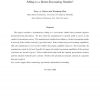Free Online Productivity Tools
i2Speak
i2Symbol
i2OCR
iTex2Img
iWeb2Print
iWeb2Shot
i2Type
iPdf2Split
iPdf2Merge
i2Bopomofo
i2Arabic
i2Style
i2Image
i2PDF
iLatex2Rtf
Sci2ools
116
click to vote
MANSCI
2010
2010
Does a Manufacturer Benefit from Selling to a Better-Forecasting Retailer?
This paper considers a manufacturer selling to a newsvendor retailer that possesses superior demand-forecast information. We show that the manufacturer's expected profit is convex in the retailer's forecasting accuracy: The manufacturer benefits from selling to a better-forecasting retailer if and only if the retailer is already a good forecaster. If the retailer has poor forecasting capabilities, then the manufacturer is hurt as the retailer's forecasting capability improves. More generally, the manufacturer tends to be hurt (benefit) by improved retailer forecasting capabilities if the product economics are lucrative (poor). These results hold under both the optimal procurement contract and the optimal wholesale price contract. Further, the optimal procurement contract is a quantity discount contract. Key words: supply-chain contracting; asymmetric information; forecasting November 2008
| Added | 20 May 2011 |
| Updated | 20 May 2011 |
| Type | Journal |
| Year | 2010 |
| Where | MANSCI |
| Authors | Terry A. Taylor, Wenqiang Xiao |
Comments (0)

